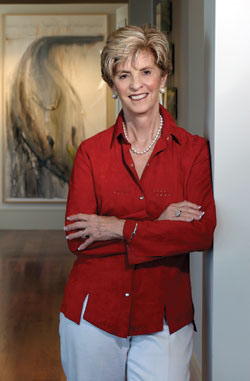Advancing Stem Cell Transplants
Nedra Kalish endows chair for cancer researcher
 |
| Nedra Kalish supports the advancement of stem cell transplants. |
The lump seemed so small, so inconsequential. Therefore, Nedra Kalish wasn’t overly concerned when her husband, Ronald Kalish, casually mentioned that a node was discovered in his neck during an annual physical. After all, Ronald Kalish was still in superb condition at 56, comparable to his playing days as a star baseball pitcher at Duke University.
“After he grew older, he took up golf and excelled at that, too,” Kalish recalls in her Coral Gables home. “He had never been sick a day in his life.”
The lump turned out to be a mantle cell non-Hodgkin’s lymphoma, a particularly virulent cancer. “He was gone seven and a half years later,” Kalish says of her husband, a retail industry executive who passed away in 2003. “We were a team, an inseparable team, my husband and I,” relates Kalish, who radiates quiet inner strength.
“We had been married a long time.”
Once the rawness of her loss began to ebb, Kalish took stock of her life. A retired psychotherapist with a master’s in social work, Kalish had always put a premium on helping others. Linking that ethos to her husband’s death, last year Kalish made a pledge to endow a chair for cancer researcher Krishna V. Komanduri, M.D., professor of medicine who serves as director of the Miller School’s Stem Cell Transplant Program at Sylvester Comprehensive Cancer Center.
“I don’t want anybody in Miami-Dade County to have to seek their treatment outside of the county,” says Kalish, an upstate New York native who resided in Chicago when her spouse was diagnosed with lymphoma. “That is why I wanted to make the gift here.
“This is a very important pledge,” continues Kalish, who does volunteer psychotherapy work one day a week at a Miami-Dade public high school. “My husband and I always believed in giving back to the community.”
Komanduri came to UM last year from the University of Texas M.D. Anderson Cancer Center, where he’d been an associate professor of medicine in the Department of Stem Cell Transplantation and Cellular Therapy and director of the bone marrow transplant fellowship program. He was brought to Kalish’s attention by W. Jarrard Goodwin, M.D., director of Sylvester.
Komanduri’s background struck a chord with Kalish, because after specialists in Chicago made a failed attempt to treat her husband’s cancer with chemotherapy, a stem cell transplant was tried. Stem cell transplantation offers the best chance of cure for patients with high-risk or relapsed lymphoma, multiple myeloma, and many subsets
of leukemia.
“I hope that Komanduri’s going to find new and better ways to accomplish transplants,” Kalish says. “There are lots of risks associated with bone marrow and stem cell transplants. You have to bring the patient down to a zero immune system, and that can be highly risky. With my husband, they could not find a bone marrow match, so they used his own stem cells.”
Komanduri is eager to make Kalish’s faith in him pay dividends. “I’m thrilled with the commitment the Kalish family has made to the Miller School in general and to the Stem Cell Transplant Program in particular,” he says.
“Through personal experience they’ve come to recognize the importance of stem cell transplantation as a curative treatment for many patients with cancers of the blood and lymph nodes.” |


